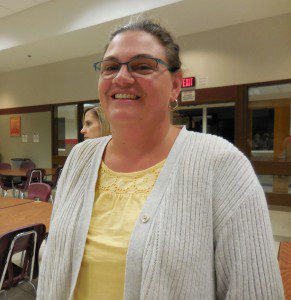
Melissa Rutkowski of the Westfield Special Education Parent Advisory Council (SEPAC) said high stakes testing isn’t good for anyone. (Photo by Amy Porter)
WESTFIELD – This past week, volunteers have been collecting signatures at the Big Y in Westfield and other locations to put the question of ending Common Core and PARCC testing on the statewide ballot in 2016. They have until November 18 to collect 66,000 signatures.
City Councilor Dan Allie, who has been stationed at Big Y, said he has collected over 500 signatures from Westfield.
“This is one of the most important issues we can work on,” Allie said. “This is our kids’ education. It’s too important to buy into a failing system of education.”
The Common Core standards were adopted in 2010 by the Massachusetts Department of Elementary and Secondary Education (DESE), and adopted into schools the following year. Common Core is a national educational initiative that details what K-12 students should know in English language arts and mathematics at the end of each grade. The initiative is sponsored by the National Governors Association (NGA) and the Council of Chief State School Officers (CCSSO) and seeks to establish consistent educational standards across the states. Several states have repealed or are in the process of repealing the standards.
The actual implementation of the Common Core, including how the standards are taught, the curriculum developed, and the materials used to support teachers, is managed at the state and local levels.
“The Common Core is widely misunderstood,” said Westfield School Superintendent Suzanne Scallion.” There has always been a lot of what needs to be taught at any given grade level.” Scallion said we live in a mobile society, and kids move all the time, and there should be some consistency from state to state.
“We’ve had frameworks for over twenty years,” she said.
Scallion feels that the issue has become political fodder.
“The Common Core is a list, not a conspiracy,” she said.
She said it was vetted in every state, and teacher representatives had an opportunity to give input. She also said that Massachusetts adopted the national standards, and then added 15 percent more standards (“what kids need to know”) as a framework for each grade.
“From my perspective, it’s largely a good thing,” Scallion said.
She said the hard part was implementing the new standards all at once.
“I became superintendent right when the new standards came out. Teachers have done a beautiful job,” she said. “Now teachers are able to instill their own creative energy.”
Gateway Superintendent David Hopson agrees.
“I think they’re actually a good set of standards, because they were originally based on Mass. state standards,” Hopson said, adding, “You’re going to throw away a lot of the work that’s been done,” if Common Core gets repealed.
Donna Colorio of End Common Core MA, the group behind the petition drive disagrees strongly.
“They were nothing like the Mass. standards,” Colorio, a teacher at Quinsigamond Community College in Worcester said. “Common Core is trademarked. We can add 15 percent, but we cannot change them.”
End Common Core MA is also holding a fundraiser on October 22 at the Shortstop Bar & Grille hosted by Allie and State Representative John Velis. A contribution of $25 is suggested but not required to attend. Guest speaker Sandra Stotsky is a former deputy commissioner of education in Massachusetts who is credited with developing the Mass standards. Stotsky served on the National Validation Committee for the Common Core State Systemic Initiative in 2009 and 2010, which she did not end up endorsing.

Gateway Student Council President Brennan Foley said Gateway students voted for MCAS over PARCC testing at a recent regional Student Council meeting in Northampton. (Photo by Amy Porter)
MCAS vs. PARCC
Velis said his role at the fundraiser is to provide information.
“I’ve got serious issues with Common Core, mainly how it is implemented, measure and tested, i.e. the PARCC test,” Velis said. “There’s nothing worse than a ballot question where people are uninformed.”
The PARCC (Partnership for Assessment of Readiness for College and Careers) is an assessment or testing vehicle of mathematics and English Language arts that coincides with the Common Core standards. The test is online and timed, and administered twice a year. Massachusetts is in a two-year rollout of PARCC, with schools volunteering to participate. DESE is expected to vote on whether to adopt PARCC statewide in November.
“Teaching to the test in my opinion has really hurt education in Mass. and that is what Common Core has evolved into,” Velis said.
He said one of the most salient critiques he has heard is that Common Core is great for states that had lower performance. Massachusetts was “at the top of the heap,” he said. “If it ain’t broke, don’t fix it. I’m damn well against it if it brings Mass. down.”
Gateway participated in the PARCC rollout last year, while Westfield chose to stick with MCAS, which have also been adapted to the Common Core standards.
“At the time, it looked like PARCC was a shoe-in,” Hopson said.
He said Gateway wanted to be sure they were technology-ready and student-ready.
“For us, it worked really well,” he said.
He thinks that even if the state board votes for MCAS, it will eventually become a computer-based test.
Scallion said that Westfield stayed with MCAS to use the same yardstick as a comparison. As for PARCC, she said, “I don’t think we know enough about it yet.”
She said it was too much, too soon.
“We were not prepared to have our kids used as guinea pigs,” she said.
Both superintendents agree with Velis that there is too much testing.
“We are without question over-testing,” Scallion said.
She thinks the pushback on Common Core has a lot to do with the “enormous” money that testing companies stand to make, and the time our kids spend taking tests.”
She said Westfield tries to keep a balance, for example giving some tests only once instead of twice a year.
“We’re trying to take control of a runaway cart,” she said.
“I would agree with many people that we use tests for the wrong reasons, and use them for purposes they weren’t really designed for,” Hopson said.
He thinks the tests have nothing to do with mastery, and are a false comparison.
Brennan Foley, a senior at Gateway and president of the student council, reported to the School Committee last week about a vote taken at a regional student council meeting in Northampton on PARCC vs. MCAS. The Gateway students voted for MCAS.
Asked why, Foley said, “Because the PARCC test is all online, and a lot of students don’t like that.”
He said that not all students work well with the time limit. He also said because the test is owned by a testing company, “fixes won’t be as fast.”
The MCAS is state-owned.
“Mass. is a leader in education,” Foley said. “A lot of states that are still with PARCC are waiting to see what Mass. does.”
Velis also expressed concern that the testing could be biased against students in Special Education.
“I am a product of Special Education. I would have struggled with the PARCC test,” Velis said.
Darlene Fernandez, Special Education Supervisor at Westfield Technical Academy, agrees.
“I’m still dealing with MCAS,” she said, adding the worst part is “when you have a child that’s successfully gone through twelve years of high school and can’t get a diploma, because they can’t pass the test.”
“High stakes testing is not good for anyone,” Melissa Rutkowski of the Special Education Parent Advisory Council (SEPAC) said.


